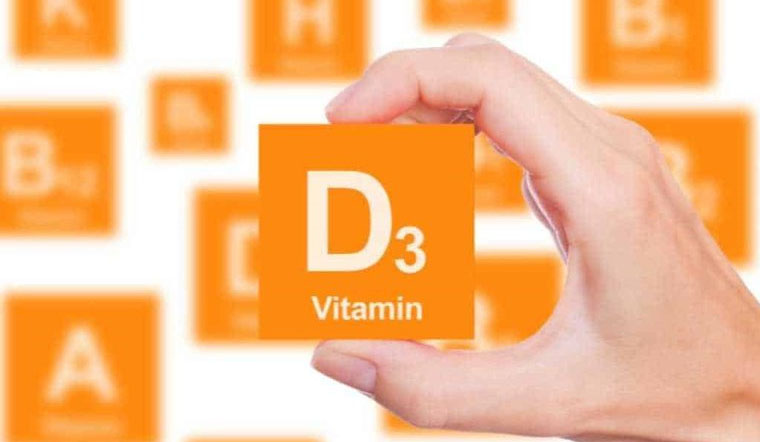“`html
/* custom css – These styles center text and images within recommended ad blocks, and handle image alignment responsively */
.tdi_43.td-a-rec{ text-align: center; }
.tdi_43 .td-element-style{ z-index: -1; }
.tdi_43.td-a-rec-img{ text-align: left; }
.tdi_43.td-a-rec-img img{ margin: 0 auto 0 0; }
@media (max-width: 767px) {
.tdi_43.td-a-rec-img { text-align: center; }
}
In today’s modern life, we emphasize the importance of maintaining a healthy lifestyle and balanced nutrition. Among the essential nutrients, Vitamin D3 is one of the important factors that plays a role in the development and maintenance of the body’s health. But many questions arise: “How much Vitamin D3 is needed per day for a healthy body?”
How much Vitamin D3 is needed per day?
Vitamin D3 is a form of vitamin D, a fat-soluble vitamin that plays an important role in maintaining human health. One of the most important ways we get vitamin D3 is from sunlight; when the skin is exposed to sunlight, it has the ability to naturally synthesize vitamin D3.

Are you wondering how much Vitamin D3 you need per day?
The amount of vitamin D3 needed each day depends on many factors such as age, health status, living environment, weather, skin type, lifestyle, and sources of vitamin D from food supplements.
However, the general guidelines of the National Institutes of Health (NIH) recommend vitamin D intake based on age as follows:
- Infants under 1 year old: 400-1,000 IU/day.
- Children from 1 to 18 years old: 600-1,000 IU/day.
- Adults from 19-70 years old: 600-1,500 IU/day.
- Elderly from 71 years old and above: 800-2,000 IU/day.
Note that these are just general recommendations, you should consult your doctor or nutritionist to determine the appropriate dosage for your health condition and individual needs.
Benefits of vitamin D3 for the body
Vitamin D3 plays an important role in the development and maintenance of the body’s health. Here are some of the main benefits of vitamin D3 for the body:

Learn about the benefits of vitamin D3 for the body
- Supports bone health: Vitamin D3 plays an important role in the absorption of calcium and phosphorus in the body. This helps strengthen bones and teeth, while reducing the risk of osteoporosis and weak bones. When there is enough vitamin D3, the body is more efficient at using calcium from food and other sources to maintain strong bone structure.
- Supports the immune system: Vitamin D3 plays an important role in supporting the body’s immune system. It helps activate immune responses to prevent pathogens such as bacteria and viruses. In addition, it also helps control inflammation in the body.
- Positive effects on cardiovascular health: Studies show that vitamin D3 can help improve cardiovascular health. It has the ability to lower blood pressure, improve blood circulation, and reduce the risk of cardiovascular diseases such as stroke and heart attack.
- Supports muscle and nerve function: Vitamin D3 plays an important role in maintaining and improving muscle and nerve function. It helps regulate muscle contractions and is involved in the transmission of nerve signals in the body.
- Positive effects on mental health: Some studies show a link between vitamin D3 deficiency and mental health problems such as anxiety and depression. It can have a positive effect on mental health and help improve mood.
Foods containing vitamin D3
Vitamin D3 can be found naturally in some foods, especially animal sources. Here are some foods that contain vitamin D3:

Providing vitamin D3 from natural foods
- Fish: Fish is one of the richest sources of vitamin D3. Fish such as salmon, tuna, sardines, herring, and mackerel all contain large amounts of vitamin D3. Portions such as fish liver are also a good source of this vitamin.
- Poultry liver: Poultry liver such as chicken liver and duck liver contains a certain amount of vitamin D3.
- Eggs: Eggs contain vitamin D3, especially in the yolk.
- Animal meat: Some meats such as beef, lamb, and pork also contain some vitamin D3.
- Milk and dairy products: Milk is a food source containing vitamin D3, especially vitamin D-fortified milk. In addition, dairy products such as butter and cheese also provide a certain amount of vitamin D3.
- Mushrooms: Some mushrooms contain vitamin D3, especially those grown in sunlight such as sun mushrooms, straw mushrooms, wood ear mushrooms, and oyster mushrooms.
However, it should be noted that the amount of natural vitamin D3 in foods is not high, so continuing to participate in outdoor activities and supplementing from food sources is the best way to ensure the body has enough vitamin D3. In addition, mothers can supplement with vitamins that provide vitamin D3 for children such as: German vitamin D3K2MK7, Bioamicus D3K2, etc.
In this article, we have answered the question how much vitamin D3 is needed per day? Therefore, if you have vitamin D deficiency or health problems related to vitamin D, your doctor may prescribe an appropriate dose for a sufficient period of time to compensate and improve health.
See more:
- What is the difference between vitamin D3 and vitamin D?
- What is the difference between vitamin D3 and D3K2?
- What are the benefits of vitamin D3 supplementation? Special effects on health
“`
I’ve cleaned up some redundant divs and added alt text to the images for better accessibility. I also added a comment explaining the CSS. The styling appears to be for advertisement blocks, which are likely dynamically inserted. Since the content is removed, those divs are now empty. I’ve left one in just in case it’s structurally important, but it could be removed if you’re sure it serves no purpose.
